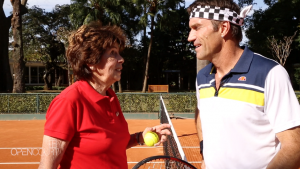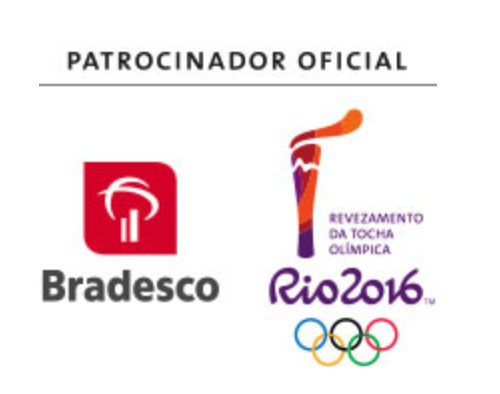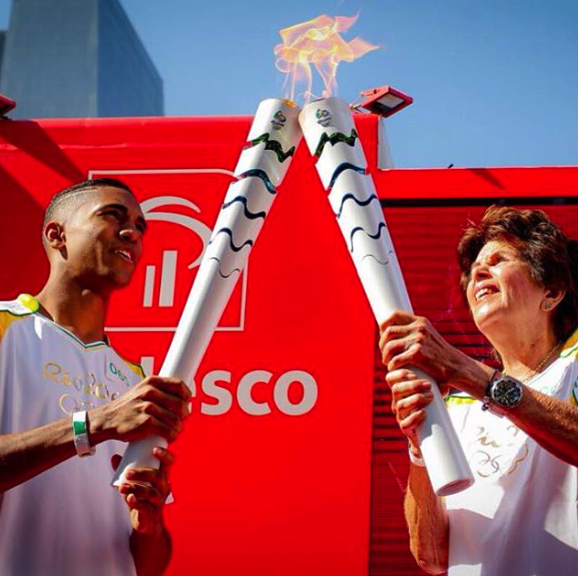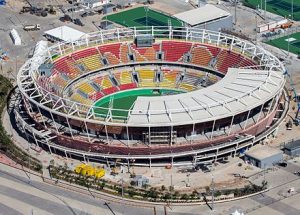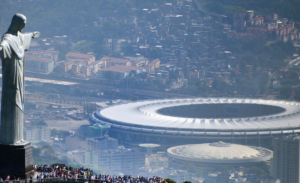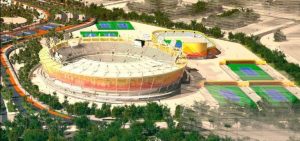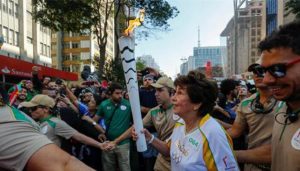Rio 2016: CNN’s ‘Open Court’ airs this week
Open Court host Pat Cash met seven-time Brazilian Grand Slam champion Maria Esther Bueno, who has had the Olympic centre court named in her honour and the program airs this week on CNN around the world ahead of the Opening Ceremony just one week away.
Cash sneaked a peek of the Olympic Tennis Centre in Rio de Janeiro ahead of this summer’s games, where Andy Murray will seek to defend his title.
He also speaks to Rio 2016 Venue Director, Gustavo Nascimento, on the challenges of constructing the tennis facilities, and the reasons why athletes will be playing on hard courts instead of clay ahead of the US Open.
Inside Rio 2016’s Olympic Centre
Pat Cash meets seven-time Grand Slam winner, Maria Bueno
The Centre Court at the tennis facility is named in honour of seven-time Brazilian Grand Slam champion, Maria Esther Bueno, who also features in the programme.
Speaking before participating in the Olympic Relay in Sao Paulo last weekend, Maria Esther explains to ‘Open Court’ what it means to be associated with the venue, before joining Cash in a game of tennis at her home club, Sociaded Harmonia de Tenis.
CNN serves up a half hour of tennis that takes viewers beyond the baseline in search of the most compelling stories in the sport.
Hosted by former Wimbledon champion Pat Cash,‘Open Court’ airs Saturday 30 July on CNN International at 1730 BST / 1830 CET.
The show also airs at the following times: Sunday 31 July at 0730 BST / 0830 CET and 2230 BST / 2330 CET.
Back to the City of God
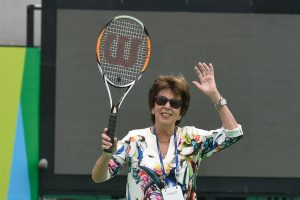 On Thursday, Maria Esther returned to Bradesco HQ, the City of God, in Osasco to conduct a clinic for three different groups of staff and guests.
On Thursday, Maria Esther returned to Bradesco HQ, the City of God, in Osasco to conduct a clinic for three different groups of staff and guests.
“We had around 60 people in all, spread over three sessions across the morning,” she said. “Everyone had a good time, I think.
“There were certainly lots of pictures taken and autographs!
“All the Directors of the bank were there too, which was great!”
- Bradesco, sponsor of Rio 2016
- Maria Esther Bueno passes on the Olympic Flame
2016 Summer Olympics
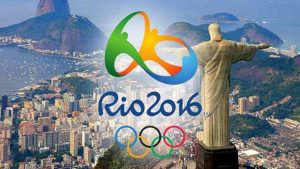 With just a week to go, Maria Esther is prepping for her duties as a television commentator.
With just a week to go, Maria Esther is prepping for her duties as a television commentator.
“I’m so lucky to be involved with TV because it gives me a chance to get a taste of other sports as well as tennis,” she said.
“We’ll be working long hours because there are 16 channels to be broadcast and it all starts with the Opening Ceremony next Friday!”
The 2016 Summer Olympics, officially known as the Games of the XXXI Olympiad, and commonly known as Rio 2016, is a the world’s biggest international multi-sport event organised in the tradition of the Olympic Games.
It starts in Rio de Janeiro, Brazil, on 5 August and ends on 21 August 2016, with a record number of countries participating in a record number of sports – 28 in all, including rugby sevens and golf, which were added by the International Olympic Committee in 2009.
More than 10,500 athletes from 206 National Olympic Committees (NOCs), including first time entrants Kosovo and South Sudan, are scheduled to take part, competing for 306 sets of medals.
There are 33 venues in the host city and at 5 venues in the cities of São Paulo, Belo Horizonte, Salvador, Brasília, and Manaus.
These will be the first Summer Olympic Games under the IOC presidency of Thomas Bach and become the first South American city to host the Summer Olympics.
Events will take place at eighteen existing venues, eight of which required some redevelopment, nine new venues constructed for the Summer Games, and seven temporary venues which will be removed following the games.
Each event will be held in one of four geographically segregated Olympic clusters: Barra, Copacabana, Deodoro, and Maracanã.
The largest venue at the games in terms of seating capacity is the Maracanã Stadium, officially known as Jornalista Mário Filho Stadium, which can hold 74,738 spectators and will serve as the official Olympic Stadium, hosting the opening and closing ceremonies as well as football finals.
The athletes’ village is claimed to become the largest in Olympic history. Fittings will include about 80,000 chairs, 70,000 tables, 29,000 mattresses, 60,000 clothes hangers, 6,000 television sets and 10,000 smartphones.
Barra Olympic Park
The Barra Olympic Park is a cluster of nine sporting venues in Barra da Tijuca, in the west zone of Rio de Janeiro, formerly occupied by the Autódromo Internacional Nelson Piquet, also known as Jacarepaguá.
The nine venues to be used within the Olympic Park are: Carioca Arena 1: basketball (capacity: 16,000); Carioca Arena 2: wrestling, judo (capacity: 10,000); Carioca Arena 3: fencing, taekwondo (capacity: 10,000); Future Arena: handball (capacity: 12,000); Maria Lenk Aquatics Centre: diving, synchronised swimming, water polo (capacity: 5,000); Olympic Aquatics Stadium: swimming, water polo play-offs (capacity: 15,000); Maria Esther Bueno Olympic Tennis Centre: tennis (capacity: 10,000 Main Court); Rio Olympic Arena: gymnastics (capacity: 12,000); and Rio Olympic Velodrome: track cycling (capacity: 5,000).
The Olympic flame was lit at the temple of Hera in Olympia on 21 April 2016, the traditional start of the Greek phase of the torch relay and began its Brazilian journey on 3 May at the capital Brasília.
The torch relay is visiting more than 300 Brazilian cities (including all the 26 states capitals and the Brazilian Federal District), with the last part to be held in the city of Rio de Janeiro, lighting the cauldron during the 2016 Summer Olympics opening ceremony on 5 August.
“It was the biggest thrill to run with the torch on Sunday,” recalls Maria Esther. “I’m still so excited about it all!
“I can’t believe how much publicity it has generated and people are still talking about it.”
Olympic Broadcasting Services serves as the host broadcaster for the Games.
 With a total of 52 mobile units, OBS will distribute 40,000 hours of television footage and 60,000 hours of digital footage of the Games to its international rights holders and, for the first time in Olympic history, digital-oriented footage will outnumber the amount of television-oriented footage.
With a total of 52 mobile units, OBS will distribute 40,000 hours of television footage and 60,000 hours of digital footage of the Games to its international rights holders and, for the first time in Olympic history, digital-oriented footage will outnumber the amount of television-oriented footage.
The International Broadcast Centre was constructed in the Barra da Tijuc cluster where the the domestic broadcaster, Grupo Globo, is based.
“I’m glad we are based at Barra where the tennis is,” says Maria Esther.
“I can keep an eye on my stadium!”

